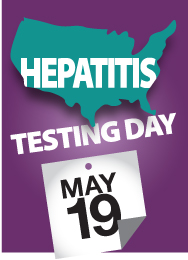This Sunday, May 19th, is National Hepatitis Testing Day. The day reminds us of the significant health threat viral hepatitis can be, the means of prevention and treatment of infections, and the importance of regular screenings.
The U.S. saw approximately 4,000 new cases of Hepatitis A in 2016. Hepatitis A (HAV) causes headache, fatigue, and gastrointestinal symptoms such as vomiting, nausea, and diarrhea. It is preventable by vaccine, and is usually transmitted person-to person by fecal-oral route or from consumption of contaminated food or water. Vaccines for HAV are generally administered to young children, but was not routinely administered to children prior to 1994, so adults can ask their health care provider about getting vaccinated. There is no cure for HAV, and patients are usually treated for management of their symptoms. Once a person has HAV, they retain the antibodies for life, and are unlikely to ever contract the infection again.
Hepatitis B virus (HBV) is also vaccine-preventable, and is common sexually transmitted or through contact with blood or bodily fluids (semen, saliva.) However, despite availability of a vaccine, the Centers for Disease Control and Prevention estimate there were approximately 20,900 new cases of HBV in the U.S. in 2016. There is no cure for HBV, but there are medications to suppress the viral load in a person’s blood, and minimize the harmful effects to the liver and other organs.
The U.S. is seeing consistently high rates of hepatitis C (HCV) in correlation with the opioid substance use epidemic. HCV is primarily transmitted through contact with infected blood, so persons who inject drugs are most susceptible to infection through sharing needles and other drug use equipment that may have come into contact with infected blood. The CDC estimates that there were 41,200 new cases of HCV in the U.S. in 2016, up from 33,900 in 2015. While there is no vaccine to prevent HCV, there are drugs that suppress the amount of virus in a person’s blood to sustained undetectable levels, effectively curing them of the disease.
The first step to protecting one’s health is getting regular health screenings to know your status. To find out where you can get tested for many health conditions, including HIV, STDs and hepatitis, visit https://gettested.cdc.gov/.




